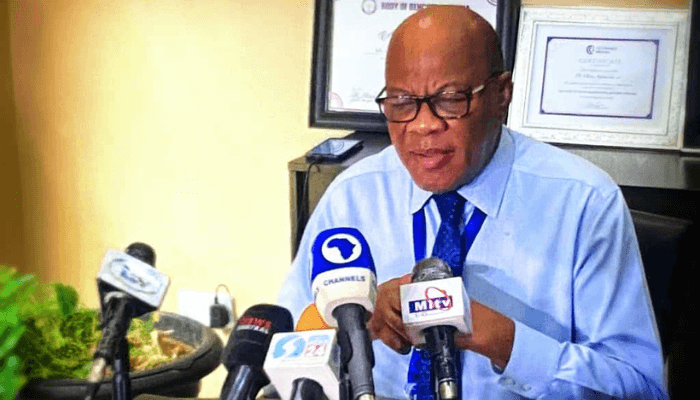Why 25 years of constitutional amendments have failed Nigeria – Agbakoba
.says, ‘devolution of powers solution to Nigeria’s problems’
Olisa Agbakoba, Senior Advocate of Nigeria (SAN), has said that devolution of powers is the solution to the myriads of Nigeria’s problems.
Agbakoba, who gave the verdict in Lagos on Wednesday while speaking to editors, said that Nigeria needed a brand-new constitution not mere amendment.
“The problem is not economic but political, and twenty-five years of constitutional amendments have failed because you cannot repair a cracked foundation with patches,” he said.
Read also: Tinubu must initiate governance restructuring for policies to impact citizens — Agbakoba
According to him, “The solution requires constitutional replacement, not amendment, establishing genuine federalism through massive devolution of powers.”
Presenting a document entitled, ‘Devolution Is the Solution: Foundational Reform Agenda for Nigeria’s Transformation (a comprehensive policy framework for constitutional replacement, fiscal federalism, and economic transformation)’, the former President of the Nigerian Bar Association (NBA) said that “extreme centralisation had trapped over two hundred million Nigerians in an unproductive informal economy, constraining GDP growth to three or four percent when the nation desperately needs ten to twelve percent to escape poverty.”
Justifying the reason for an urgent devolution of powers, he said: “Nigeria operates under a fatal illusion—a supposed federation where the Federal Government controls 97% of all revenues while 35 of 36 States cannot pay salaries without federal bailouts.
“Seven hundred and seventy-four local governments and 36 States, representing 90% of Nigeria’s governance architecture, exist as mere distribution centres for federal handouts rather than engines of development.”
He noted that although the recent reforms—fuel subsidy removal and foreign exchange liberalisation— embarked upon by the President Bola Ahmed Tinubu Administration was economically sound, “They cannot transform a nation when they operate within fundamentally broken governance structures.”
Read also: Agbakoba condemns mandatory voting law, says he’d choose jail instead
He advocated a situation where states own their resources, control their police, manage electricity generation and distribution, oversee solid minerals, and retain sixty percent of internally generated revenue.
“Local Governments need constitutional authority over primary education and healthcare, water supply, sanitation, and community development, while the Federal Government retreats to truly national functions—currency, defense, immigration, and foreign affairs.
“This restructuring would transform Nigeria from a centralised redistribution mechanism into a dynamic multi-centered economy where governance happens closest to the people and economic activity flourishes at every level of society,” he said.
He further noted that “Nigeria possesses untapped revenue potential worth 25 to 35 trillion naira annually that remains locked away by legislative failures and regulatory capture.”
Read also: Constitutional amendment stalls in Senate as reforms drag
The Maritime lawyer decried the early arrival of campaign ahead of 2027, but however, noted that the Presidential election “potentially moved to November 2026, represents Nigeria’s final opportunity for peaceful transformation before demographic pressures and economic stagnation make change impossible.”
He tasked every Presidential candidate to “commit to delivering a new constitution, implementing state police and resource control with minimum fifty percent derivation, reducing federal ministries from fifty to eighteen, divesting government from all businesses, and unlocking the identified revenue streams through legislative reform.”
He added that “Whether Atiku Abubakar’s historical understanding of devolution, Tinubu’s economic boldness, or Peter Obi’s fresh perspectives translate into, the political will for fundamental restructuring remains to be seen, but Nigerians must select based on commitment to constitutional replacement and devolution rather than party affiliation or ethnic consideration.”

